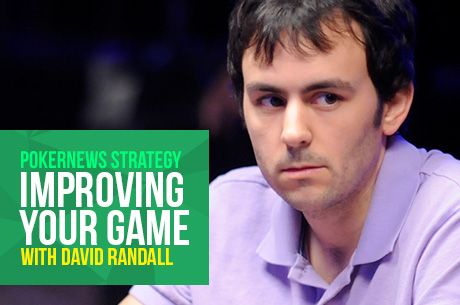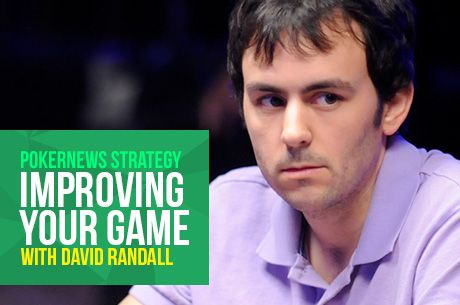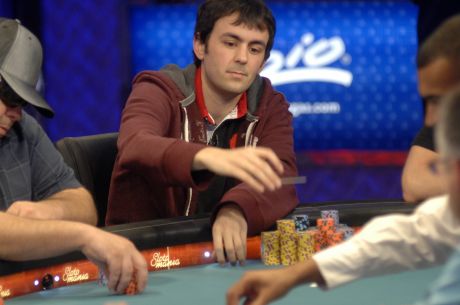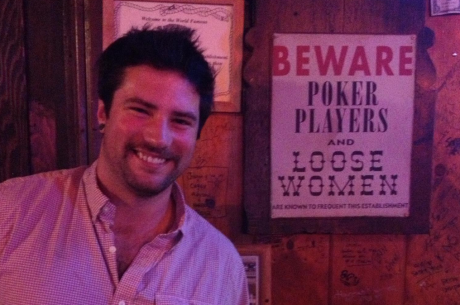Improving Your Game with David Randall, Vol. 3: Psychology of Downswings and Empowerment

I would again like to thank you all for the feedback on my articles. I had a particularly touching experience last week when I was approached by a player I have played with for years telling me that my recent article had given them a completely different outlook on the game. It really began to hit home that my writings do have an impact out there.
Today, we are going to talk about something a little more difficult than my previous articles. We are going to discuss the psychology behind downswings and how to deal with the mental cycles that come as a result. As an instructor, I commonly come into contact with people on downswings. After all, in general, when people are running hot they always tend to believe they are the wisest of experts (including myself to some extent) and do not need help. What I often see is someone coming to me, me helping them reignite their fire, and then they disappear into the sunset for a while until another downswing emerges in a month or two and we have to put their confidence back together.
Downswings always seem to come in cycles. When these downswings strike, they are coupled with a mentality. Have you ever been on a downswing and caught yourself having these thoughts:
- I haven’t hit a draw in a week!
- I haven’t flopped a set in a year!
- I haven’t coolered someone in a decade!
- Every situation I find myself in is one doomed with a negative outcome!
- I never run hot at the end of a tournament!
- I feel like I’m playing so well, but nothing is going my way!
- I cannot win a flip!
- Why even try?!?!
If you have repeatedly had one or more of these thoughts then you probably were at some stage of a downswing cycle. As I have explained in previous articles, poker is a game of predators and prey. When your attitude is doused in negativity, others around can smell it on you. They can sense your negative expectation and because of the nature of the game, they feed on it. Imagine if you could play every session as if your previous one was a big win. Sitting relaxed at ease, patiently waiting to take spots without having to give a second thought to whether you’re forcing it or not. Uninhibited by your own doubts. Free to use your analytical powers with confidence that you will derive the correct conclusion. Then you would always be the predator. Unfortunately, it cannot always be this way.
Every poker player goes through downswings and experiences these cycles. When these downswings strike, you will never feel so alone in your life. What strikes me about the more successful players is their resilience, their ability to jump right back into an aggressively positive mentality that’s ready for war. This has always been an issue for me and the further back you look into my career’s past the worse it was. I would get into extremely long ruts sometimes lasting as long as six months (I played mostly tournaments online back in the day where the large variance can feed the negative cycles even more). I reached a point of awareness where I figured out that these cycles were happening at the rock bottom of my worst downswing and I decided that something had to be done.
So, what's the key to get myself back into a mentally productive place again? Empowerment. I will begin by supplying my favorite definition of empowerment:
"Empowerment is the process of enabling or authorizing an individual to think, behave, take action, and control work and decision making in autonomous ways. It is the state of feeling self-empowered to take control of one's own destiny."
When things are going smoothly in poker, empowerment comes as second nature. You are utilizing your gifts for a profit. You are getting what you deserve and all of your hard work is paying off. When things are going badly, your empowerment is stripped and with it goes your ability to confidently make the big laydowns or calls you would otherwise. Once this sets in, it becomes very easy to go into "robot mode" where you rely on your most primitive strategies because you don’t have the confidence to execute the more complex.
There is no easy way to instantly get out of these cycles. They will happen. They happen to everyone, and you must accept it. I can say this until I’m blue in the face, but it will not make you feel better, and when you do not feel empowered it is your feelings that are at stake. For me, the biggest step was realizing there was a deficiency of empowerment when things were not going my way and because of that I allowed myself to become a robot and dig a bigger hole. It became important for me to find ways to empower myself. For example, I began playing basketball three days per week, writing poetry almost daily, working out in the gym, teaching poker lessons, and writing articles for PokerNews. Every action I did outside of poker was something that catered to my empowerment.
Since I began doing these things, I have noticed that my downswings "get in my head" less. They last for less time, and most importantly they do not feel the same as I’m much more able to keep things in perspective. It is important to have some type of backup plan for your feelings. Do not rely solely on poker or you will instantly give those that do this properly an edge over you. Every single student I’ve had (approaching 150 for my career now) has found a method of empowerment. Even the most naturally negative people I have ever met have ways to empower themselves. The two keys to doing this are awareness and effort. Hopefully, this article gave you the awareness.
Now, shut your computer off and take some time to quietly think about what empowers you.
David Randall is a professional poker player residing in Las Vegas, Nevada. He has nearly $700,000 in live tournament earnings, including one World Series of Poker final table and one World Poker Tour final table. The largest score on Randall's live record is from a $1,500 No-Limit Hold'em event at the 2010 WSOP when he took third for $270,299.
For more strategy tips, tricks, tutorials, podcasts, and more, head to the PokerNews.com Strategy section of the site and start exploring today!
In this Series
- 1 Improving Your Game with David Randall, Vol. 1: Teaching Through Examples
- 2 Improving Your Game with David Randall, Vol. 2: Creating the Perfect Hybrid Player
- 3 Improving Your Game with David Randall, Vol. 3: Psychology of Downswings and Empowerment
- 4 Improving Your Game with David Randall, Vol. 4: No Substitute for Relentless Belief
- 5 Improving Your Game with David Randall, Vol. 5: Developing Mental Toughness
- 6 Improving Your Game with David Randall, Vol. 6: Arguments Are Opportunities To Improve









